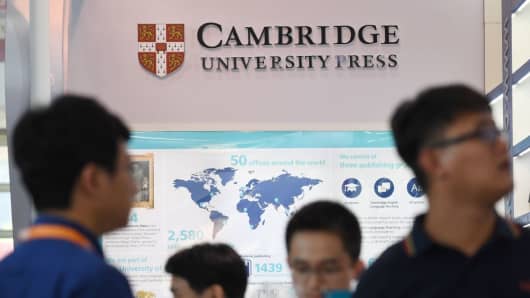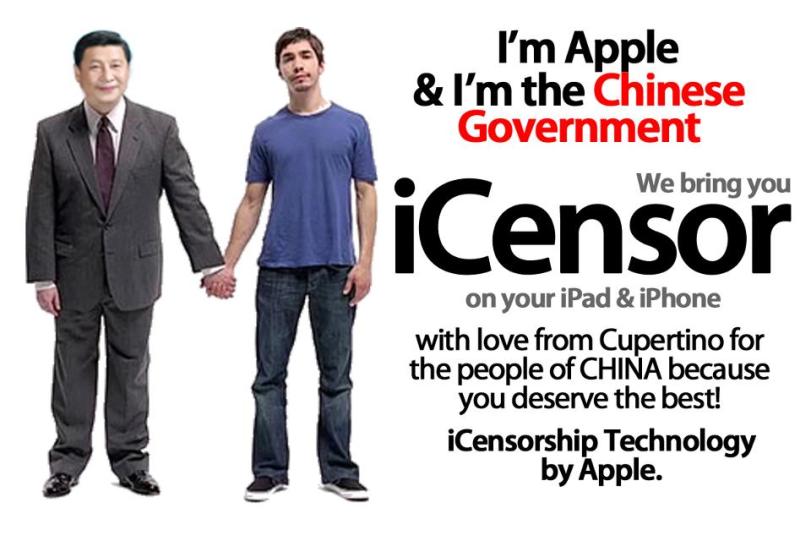By Cheang Ming

With its decision to reinstate hundreds of academic articles, a division of Cambridge University has done what larger entities have failed to: stand up to China.
Cambridge University Press, the world's oldest publishing house, on Monday reversed an earlier decision to block access within China to 315 articles in the China Quarterly, a leading academic journal focusing on contemporary China.
Most articles that had been blocked focused on topics seen as inconvenient to the Chinese government, including the Cultural Revolution, the Tiananmen Square protests and Taiwan.

People stand outside the Cambridge University Press stand at the Beijing International Book Fair in Beijing on August 23, 2017.
The publisher had blocked those articles from being accessed on the mainland after receiving an "instruction" to do so from a Chinese agency, CUP said in an Aug. 18 statement.
While China has blocked other media platforms — such as Reuters and the Wall Street Journal — in the past, the move to censor CUP was different due to the academic journal's smaller, niche readership.
Anita Chan, an Australian National University senior fellow, told CNBC the move was "unprecedented."

People stand outside the Cambridge University Press stand at the Beijing International Book Fair in Beijing on August 23, 2017.
The publisher had blocked those articles from being accessed on the mainland after receiving an "instruction" to do so from a Chinese agency, CUP said in an Aug. 18 statement.
While China has blocked other media platforms — such as Reuters and the Wall Street Journal — in the past, the move to censor CUP was different due to the academic journal's smaller, niche readership.
Anita Chan, an Australian National University senior fellow, told CNBC the move was "unprecedented."
Two articles authored by Chan were among those blocked.
Meanwhile, a petition started by Peking University Associate Professor Christopher Balding stated that the academic community was "disturbed" by the Chinese government's attempt to "export its censorship on topics that do not fit its preferred narrative."
Public outcry from academics and activists eventually led to the articles being reinstated by CUP on Aug. 21.
Even though it took several days of heated protests for the Cambridge unit to change its mind, the publisher's ultimate decision highlights moves taken in the opposite direction by multinational corporations to placate regulators on the mainland.

Multinationals fall in line
One of those companies is Apple.
The Cupertino-based tech giant drew ire for removing apps from virtual private network (VPN) providers from the Chinese version of its App Store in July.
Meanwhile, a petition started by Peking University Associate Professor Christopher Balding stated that the academic community was "disturbed" by the Chinese government's attempt to "export its censorship on topics that do not fit its preferred narrative."
Public outcry from academics and activists eventually led to the articles being reinstated by CUP on Aug. 21.
Even though it took several days of heated protests for the Cambridge unit to change its mind, the publisher's ultimate decision highlights moves taken in the opposite direction by multinational corporations to placate regulators on the mainland.

Multinationals fall in line
One of those companies is Apple.
The Cupertino-based tech giant drew ire for removing apps from virtual private network (VPN) providers from the Chinese version of its App Store in July.
VPNs allow individuals in China a way of bypassing its "Great Firewall," a system that restricts access to the internet.
In December last year, Apple pulled a similar move when it removed the New York Times' app from its Chinese app store.
Reuters also reported last month that the iPhone maker announced it was building its first data center in China after the introduction of new cybersecurity laws requiring companies to store sensitive data on servers in China.
In December last year, Apple pulled a similar move when it removed the New York Times' app from its Chinese app store.
Reuters also reported last month that the iPhone maker announced it was building its first data center in China after the introduction of new cybersecurity laws requiring companies to store sensitive data on servers in China.
The new rules were vague while the practice of storing data on local servers could expose companies to government monitoring.
Apple isn't the only company complying with tougher regulations in China either.
Amazon's Chinese partner told clients it would "shut down" unauthorized VPNs, Reuters reported earlier this month.
Like Apple, an Amazon Web Services spokesman said the company had to work through Chinese partners to adhere to local regulations, Reuters added.
In 2014 media reports said LinkedIn (now a subsidiary of Microsoft) was censoring posts of a sensitive nature from being seen in China so it could operate in the mainland market.
Even though well-known companies — such as Apple and Google — make headlines when they either accept or reject regulator demands, the decision-making process is more "nuanced and mundane" for most firms, said Christopher Beddor, an associate at consultancy Eurasia Group.
"For those companies that are impacted by censorship regulations, there's often a behind-the-scenes back-and-forth discussion with local partners and regulators over how to adapt the content for the Chinese market," Beddor added.
That discussion happens, in part, because companies are trying to make money in China — as their shareholders likely desire — whereas CUP has more leeway as a university department.
What's next
Chinese authorities reacted to CUP's reversal just hours after its announcement: Regulators promptly scrubbed a Weibo post from the Cambridge University account announcing the decision, according to a report from the Guardian on Tuesday.
However, the academic publisher's website remained available in China.
Greatfire.org, a website monitoring censorship in the country, found that the webpage for "The China Quarterly" was uncensored as of Aug. 24.
In 2014 media reports said LinkedIn (now a subsidiary of Microsoft) was censoring posts of a sensitive nature from being seen in China so it could operate in the mainland market.
Even though well-known companies — such as Apple and Google — make headlines when they either accept or reject regulator demands, the decision-making process is more "nuanced and mundane" for most firms, said Christopher Beddor, an associate at consultancy Eurasia Group.
"For those companies that are impacted by censorship regulations, there's often a behind-the-scenes back-and-forth discussion with local partners and regulators over how to adapt the content for the Chinese market," Beddor added.
That discussion happens, in part, because companies are trying to make money in China — as their shareholders likely desire — whereas CUP has more leeway as a university department.
What's next
Chinese authorities reacted to CUP's reversal just hours after its announcement: Regulators promptly scrubbed a Weibo post from the Cambridge University account announcing the decision, according to a report from the Guardian on Tuesday.
However, the academic publisher's website remained available in China.
Greatfire.org, a website monitoring censorship in the country, found that the webpage for "The China Quarterly" was uncensored as of Aug. 24.
As the CUP website used Hypertext Transfer Protocol Secure (HTTPS), the only way for authorities to block individual pages would be to block the entire website, Greatfire.org co-founder Martin Johnson (a pseudonym) told CNBC.
The CUP website was also likely to remain unblocked, Charlie Smith, a pseudonym used by another Greatfire.org co-founder, told CNBC in an email.
The CUP website was also likely to remain unblocked, Charlie Smith, a pseudonym used by another Greatfire.org co-founder, told CNBC in an email.
He said that's because the financial cost required to access journal articles acted as "its own form of censorship."

An aerial view of King's College, University of Cambridge. Cambridge University Press is the publishing business of the university.
"I think that CUP probably overreacted to some request from an official," Smith added.
Some China watchers have linked the tightening in regulations to the upcoming 19th National Congress of the Communist Party in the fall as bureaucrats attempt to step up their game ahead of an anticipated leadership reshuffle.

An aerial view of King's College, University of Cambridge. Cambridge University Press is the publishing business of the university.
"I think that CUP probably overreacted to some request from an official," Smith added.
Some China watchers have linked the tightening in regulations to the upcoming 19th National Congress of the Communist Party in the fall as bureaucrats attempt to step up their game ahead of an anticipated leadership reshuffle.
However, the new level of scrutiny is unlikely to subside after the event, experts said.
"The fundamental trend remains toward more state control over media and information," Beddor told CNBC.
Although the pace at which new regulations are initiated could slow after the party congress, it was unlikely that rules would be reversed following the event's conclusion, he added.
Even though Apple's Cook was hopeful that engaging with the authorities would lead to fewer restrictions in the future, not everyone was equally optimistic.
"Censorship in China is a long-term vision and is not really a tap that get(s) turned on and off. It's not like sites get unblocked after the congress finishes. They stay blocked. Which is part of Xi Jinping's grand plan," said Smith.
Meanwhile, some experts have voiced fears that China's censorship regime may even extend beyond its borders.
University of Canterbury professor Anne-Marie Brady, who had one article in the China Quarterly blocked in the mainland, said, "China under Xi is now not only trying to control the information environment in China, but also the external information environment when it pertains to China."
"The fundamental trend remains toward more state control over media and information," Beddor told CNBC.
Although the pace at which new regulations are initiated could slow after the party congress, it was unlikely that rules would be reversed following the event's conclusion, he added.
Even though Apple's Cook was hopeful that engaging with the authorities would lead to fewer restrictions in the future, not everyone was equally optimistic.
"Censorship in China is a long-term vision and is not really a tap that get(s) turned on and off. It's not like sites get unblocked after the congress finishes. They stay blocked. Which is part of Xi Jinping's grand plan," said Smith.
Meanwhile, some experts have voiced fears that China's censorship regime may even extend beyond its borders.
University of Canterbury professor Anne-Marie Brady, who had one article in the China Quarterly blocked in the mainland, said, "China under Xi is now not only trying to control the information environment in China, but also the external information environment when it pertains to China."
Aucun commentaire:
Enregistrer un commentaire